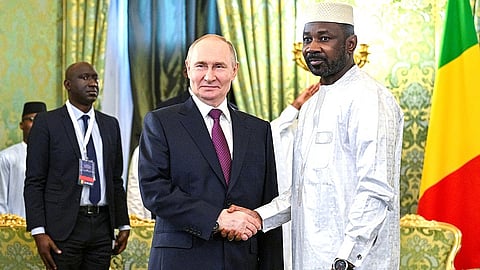

Russia and Mali have signed three key agreements to bolster trade, scientific collaboration, and nuclear energy development.
The treaties, formalized during a meeting in Moscow between Russian President Vladimir Putin and Mali’s transitional leader, Colonel Assimi Goita, aim to fortify the legal framework for cooperation.
The agreements cover the establishment of an intergovernmental commission for trade and research, the fundamentals of bilateral relations, and the peaceful use of nuclear energy.
This marks a significant step in the 65-year diplomatic relationship between the two nations.
The agreements reflect Mali’s pivot toward Russia, particularly since Goita’s 2021 coup, which strained ties with former colonial power France.
Russia has emerged as a key partner in sectors like transport, energy, culture, and security.
Putin highlighted the upward trend in trade, noting potential growth in geological exploration, logistics, and humanitarian efforts.
Mali’s interest in a Russian-designed nuclear power plant underscores the strategic energy focus. Meanwhile, Russian Defense Minister Andrei Belousov and his Malian counterpart, Sadio Camara, agreed to deepen military-technical cooperation to enhance Mali’s security and sovereignty.
Mali’s alignment with Russia mirrors a broader trend among Sahel nations, including Niger and Burkina Faso, which have also turned to Moscow for support against persistent jihadist insurgencies.
Despite Russian assistance, including the presence of the Africa Corps following the Wagner Group’s withdrawal, violence in Mali has escalated.
Goita, who paid respects at the Tomb of the Unknown Soldier during his five-day visit, emphasized the trust and effectiveness of the partnership.
“This official visit will contribute to further deepening our relationship in a spirit of mutual trust,” he said, signaling Bamako’s commitment to expanding ties with Moscow.